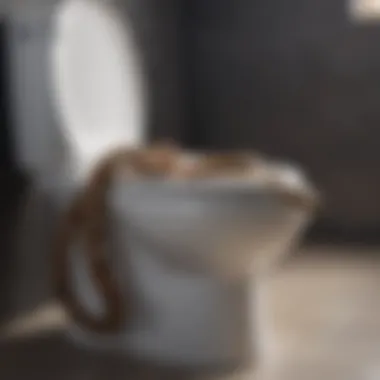Mastering the Hand Held Toilet Snake: An In-Depth Guide


Intro
Managing clogs in toilets can be a frustrating task for homeowners. One effective tool that stands out is the handheld toilet snake. This device offers a practical solution for unclogging toilets with minimal effort. Understanding its operation, benefits, and maintenance will empower you to handle such plumbing issues more confidently.
This guide will explore how a handheld toilet snake can assist you in managing common toilet problems. It will break down its unique features and help you choose the right type for your needs. You will gain insight into proper usage techniques and maintenance practices to ensure longevity and efficiency of your toilet snake.
By the end of this article, you will be equipped with the knowledge to tackle toilet clogs effectively, ultimately enhancing the efficiency of your home plumbing.
Understanding the Handheld Toilet Snake
A handheld toilet snake, also known as a toilet auger, is a simple plumbing tool designed to clear clogs within a toilet. Unlike traditional plungers, which rely on suction, a toilet snake uses a flexible cable with a corkscrew tip to dislodge blockages. This design allows it to reach deeper into the plumbing system.
Advantages of Using a Handheld Toilet Snake
The advantages of utilizing a handheld toilet snake are numerous:
- Effectiveness: It can effectively remove stubborn clogs that plungers cannot reach.
- Ease of Use: Most snakes are straightforward to operate, even for novices.
- Cost-Effective: Compared to hiring a plumber, a handheld snake is a low-cost solution for managing clogs.
- Durability: A well-maintained toilet snake can last for years.
"A handheld toilet snake is the ideal tool for homeowners looking to maintain their plumbing without incurring high costs."
Choosing the Right Handheld Toilet Snake
When selecting a handheld toilet snake, consider these aspects:
- Length of the Cable: Longer cables can reach deeper clogs. Typical lengths vary from 3 to 6 feet.
- Cable Thickness: Thicker cables can handle tougher clogs but may be harder to maneuver.
- Handle Design: An ergonomic handle can enhance comfort while you work.
Best Practices for Using a Handheld Toilet Snake
Using a toilet snake correctly is crucial for effectiveness:
- Preparation: Put on gloves and gather your tools. Have a bucket ready for any mess.
- Insert the Snake: Slowly feed the snake into the toilet bowl.
- Rotate the Handle: Turn the handle to hook onto the clog and dislodge it.
- Pull Out the Snake: Carefully extract the snake, and dispose of any debris.
- Flush the Toilet: Ensure the blockage is cleared by flushing.
Maintenance of Your Handheld Toilet Snake
Proper care ensures your toilet snake remains effective:
- Clean After Use: Wipe down the cable to remove debris.
- Store Properly: Keep it in a dry place to prevent rust.
- Inspect Regularly: Check for any damage to the cable that may affect performance.
By following these guidelines, you can maintain your toilet snake and prevent future clogs from becoming a significant headache.
This comprehensive guide should provide you with an understanding of the handheld toilet snake, its advantages, and its proper usage. You are now better equipped to handle plumbing issues in your home.
Understanding the Hand Held Toilet Snake
The use of a hand-held toilet snake can greatly simplify the tasks related to plumbing in households. Understanding its function and importance is the first step towards effective home maintenance. Many people encounter clogged toilets, a common nuisance in any home. A hand-held toilet snake is essential to address such issues. It empowers homeowners to avoid costly plumber visits and can save time when faced with a blockage.
Definition and Purpose
A hand-held toilet snake, also known as a closet auger, is a tool designed to remove stubborn clogs in toilets. Its primary function is to clear blockages caused by waste, toilet paper, or other materials that impede water flow. Unlike plungers, which apply pressure, toilet snakes use a mechanical mechanism to grab and pull out material that is causing the obstruction. This definition highlights the snake’s role in maintaining plumbing efficiency, emphasizing its value in a home.
The purpose behind utilizing a hand-held toilet snake includes:
- Cost Efficiency: It eliminates the need for professional plumbing services for minor clogs.
- User Control: Homeowners can tackle the problem at their convenience, without waiting for a scheduled appointment.
- Immediate Resolution: It allows for quick fixes, where a snake can often dislodge a clog in a matter of minutes.
How It Works
The mechanism of a hand-held toilet snake is relatively simple but effective. A snake consists of a long, flexible metal cable attached to a handle. The tip of the cable has a coiled end or auger, which is designed to navigate bends in plumbing and grasp materials that create blockages.


To use the snake, the following steps are typically involved:
- Insertion: The snake is inserted into the toilet bowl until the auger reaches the clog.
- Operation: The user turns the handle, which rotates the cable and auger. This rotation allows the auger to snag debris.
- Clearing: Once the clog is engaged, pulling the snake back out pulls the obstruction with it.
Understanding these steps is beneficial. It prepares users for what to expect during the unclogging process. With minimal effort, a hand-held toilet snake can help restore proper functioning of the toilet quickly.
"A hand-held toilet snake is a practical tool that embodies the essence of do-it-yourself home maintenance."
In summary, knowing the definition, purpose, and operational mechanics of a hand-held toilet snake equips homeowners with the insights needed to effectively manage toilet clogs. This knowledge ensures that they can respond quickly and efficiently when faced with such plumbing issues.
Common Causes of Toilet Clogs
Understanding the Common Causes of Toilet Clogs is essential for any homeowner. Recognizing these causes can not only help in preventing future blockages but also enhance the effectiveness of tools like the hand-held toilet snake. Many homeowners may find themselves frustrated and confused when facing clogged toilets. By delving into the reasons for such clogs, individuals can make informed decisions, saving time and money in the long run.
Flushable Products Misconceptions
Flushable products can be deceptive. Many items marketed as flushable still compromise toilet function. Wet wipes, feminine hygiene products, and even certain paper towels often do not break down as advertised. This leads to a common assumption that flushing these items is safe. The reality is that toilet plumbing is not designed to handle anything other than human waste and toilet paper. The use of these items can contribute significantly to clogging. By understanding what can genuinely be flushed, homeowners can mitigate potential issues.
Accumulation of Waste
Accumulation of waste is another vital cause of clogs. Over time, toilet plumbing can become less efficient due to the build-up of minerals, waste, and other materials. This can lead to slower drainage, which might go unnoticed until a complete blockage occurs. Regular maintenance is crucial. Flushing hot water, vinegar, or even baking soda can help break down any potential build-up. Detecting signs of slow drainage early can prevent the heightened frustration of complete clogs, making the use of a toilet snake less frequent.
Non-Flushable Items
Non-flushable items pose a significant threat to your plumbing system. Items such as toys, dental floss, and cotton balls often find their way into toilets, whether accidentally or through negligence. These items do not dissolve and can easily create blockage. The distinction between flushable and non-flushable is often misunderstood, leading to preventable plumbing issues. Homeowners should educate themselves on proper disposal methods for such items and ensure that the toilet remains free from any foreign objects.
"Properly understanding what goes down your toilet can save you from serious plumbing troubles."
In summary, being aware of common causes of toilet clogs helps homeowners maintain their plumbing systems effectively. This knowledge not only informs better daily practices but also empowers individuals to use tools like the hand-held toilet snake when needed.
Types of Hand Held Toilet Snakes
Understanding the various types of hand-held toilet snakes is crucial for homeowners. Each type has unique features that cater to different clogging situations. Selecting the right one can save time, effort, and even prevent damage to your plumbing system. With many options available, it’s essential to understand their advantages and considerations.
Manual Models
Manual models of hand-held toilet snakes are simple yet effective tools. They are typically made of a metal or plastic cable with a handle at one end. These snakes operate using physical force. You insert the snake into the toilet and manually turn or push the cable to break up the clog.
- Advantages:
- Considerations:
- Cost-effective compared to power-assisted alternatives.
- No need for batteries or electricity.
- Easily portable and accessible for quick fixes.
- Provides a direct connection to the clog, allowing for precise maneuvering.
- Requires physical effort and some technique.
- Might not be suitable for severe blockages.
- Users must be cautious to avoid damaging the toilet bowl.
These models are particularly beneficial for periodic maintenance or minor clogs caused by accumulated waste.
Power-Assisted Snakes
Power-assisted snakes represent a significant advancement over manual types. These tools are equipped with electric motors, enabling users to tackle tougher blockages with less physical strain. Popular brands like Ridgid and DeWalt produce versions designed specifically for toilet use.
- Advantages:
- Considerations:
- More effective for stubborn clogs where manual effort may fail.
- Reduces physical labor significantly, which benefits those who may struggle with manual options.
- Often comes with different attachments for tackling various types of clogs.
- Generally more expensive than manual models.
- Requires access to an electrical outlet or batteries.
- Users must be cautious with operation to avoid excessive strain on plumbing.
Power-assisted snakes can effectively handle a wide range of clogs, making them suitable for larger households or more serious issues.
Flexible vs. Rigid Snakes


When choosing a hand-held toilet snake, the flexibility of the cable plays a critical role in its effectiveness. Flexible snakes can maneuver through bends in plumbing, while rigid ones are better for straight shots.
- Flexible Snakes:
- Rigid Snakes:
- Adapt to the twists and turns in plumbing.
- Ideal for toilets where blockages are deep or complex.
- Provide excellent torque for breaking clogs in straight pipes.
- More effective in situations where blockages are near the toilet's entrance.
Understanding these differences is key to making the right choice. Ensuring the snake can navigate your plumbing will lead to more successful unclogging ventures.
"Choosing the right type of hand-held toilet snake is essential to effectively manage clogs and maintain home plumbing."
By knowing the main types of hand-held toilet snakes available, homeowners can select the right tools for their plumbing maintenance needs.
Selecting the Right Hand Held Toilet Snake
Choosing the right hand held toilet snake is an essential step for effective drain clearing. The correct choice can make the difference between a successful unclogging and a frustrating experience. Understanding your needs and the specific qualities of the tools available is key to making an informed decision. This section will delve into what to consider during the selection process.
Assessing Your Needs
When selecting a hand held toilet snake, the first task is to assess your individual needs. It’s critical to understand the type of clogs you frequently face. Different snakes serve different purposes, so identifying the most common issues can guide your selection.
- Frequency of Use: If clogs are a rare occurrence, a basic manual model may suffice. Frequent clogs, however, suggest a need for a more robust tool, possibly a powered snake.
- Location of Use: Consider where you will be using the snake. Some areas may require a flexible design to reach intricate paths, while others can accommodate a more rigid model.
- Type of Clog: Assess whether your clogs are typically caused by waste and toilet paper or by foreign objects. This may impact the choice of tools; for example, stronger snakes are better for tougher blockages.
Taking the time to thoroughly assess your conditions allows you to select a tool tailored specifically to your challenges.
Material Considerations
The material of a hand held toilet snake is another critical factor. Different materials offer varying advantages that can affect durability and performance. Understanding these can help you choose a snake that will meet your needs over time.
- Steel Snakes: These are popular for their durability and strength. They handle tough clogs well but may be prone to rust if not cared for properly.
- Plastic Snakes: Lightweight and easy to use, plastic options are generally suited for gentler clogs. They are resistant to corrosion but may not withstand heavy-duty use.
- Coated Metal Snakes: Some snakes come with a protective coating, offering the ability to combine strength with rust resistance. This can be beneficial for longevity and maintaining performance.
Considering the advantages each material brings can significantly influence the efficiency and lifespan of your tool.
"Selecting the right snake extends beyond basic functionality; it encompasses a deep understanding of user needs and product characteristics."
Techniques for Using a Hand Held Toilet Snake
Understanding the proper techniques for using a hand held toilet snake is fundamental for effective unclogging. This not only enhances the performance of the tool but also minimizes potential damage to your plumbing. Correct usage techniques can lead to successful unclogging while preventing further complications. There is a sequential process that one must follow to maximize the potential of the snake and ensure that your plumbing remains undamaged and functional.
Preparation Steps
Before employing the hand held toilet snake, preparation is essential. Proper preparation stems from understanding the surroundings and ensuring safety.
- Gather Supplies:
- Clear the Area:
Ensure the floor is clear of any obstacles. This safety step can prevent slips and falls. Also, remove any items around the toilet that may interfere during the snaking process. - Safety Measures:
Turn off the water supply to the toilet if necessary. While it may not always be required, this step can help reduce water pressure and make the procedure less messy.
- A pair of rubber gloves for hygiene and protection.
- A bucket, to catch any spilled water.
- Old towels or rags to clean up potential messes.
- A flashlight, to inspect the toilet bowl for visibility.
Inserting the Snake
Inserting the snake correctly is crucial for successful clog removal. Here’s how to do it right:
- Ease the Snake In:
Gently insert the end of the snake into the toilet bowl. It is important to hold the snake steadily while doing this. Be cautious not to apply excessive force which might damage the toilet. - Find the Clog:
As you push the snake deeper, feel for resistance, which usually indicates the presence of a clog. Note where the resistance is most pronounced, as this will guide your next steps. - Adjust the Angle:
If you encounter a blockage, slightly angle the snake as you push it forward. This may allow it to navigate around any bends in the pipes.
Clearing the Clog
Once you have reached the clog, it’s time to clear it. Effective techniques can differ based on how stubborn the clog is:


- Rotate the Snake:
After reaching the clog, rotate the snake in a clockwise motion. This can help break up the blockage. Consistent rotation is often more effective than merely pushing through. - Pull and Push Method:
After some rotation, gently pull the snake back while continuing to rotate. This helps collect debris on the snake's coils, providing more effective clog removal. - Repeat if Necessary:
If the clog does not clear immediately, repeat the insertion and rotation process until you feel that the blockage has cleared.
Post-Use Cleanup
After you successfully clear a clog, proper cleanup is essential to maintain hygiene and functionality.
- Remove the Snake Carefully:
Gently pull the snake out of the toilet and wipe it with a disinfectant. Be cautious to prevent splashing. - Clean the Toilet:
Use a dedicated toilet brush and cleaner to scrub away any residual debris. A clean toilet ensures that further clogs are less likely to occur after using the snake. - Store the Snake Safely:
Rinse the snake thoroughly and store it in a dry place to prevent rust and damage, ideally in a dedicated container. - Wash Your Hands:
Always wash your hands thoroughly after handling the snake, even if you wore gloves during the process.
By following these techniques, you can effectively handle toilet clogs with a hand held toilet snake. Understanding each step allows for a thorough approach that saves time and reduces frustration.
Maintaining Your Hand Held Toilet Snake
Proper maintenance of your hand held toilet snake is vital for ensuring its longevity and effectiveness. A well-maintained snake can alleviate toilet clogs efficiently and can save you money in costly plumbing repairs. Neglecting maintenance may lead to reduced performance or even damage to the tool itself. Here, we will explore key aspects of maintaining your toilet snake, focusing on cleaning, storage, and care tips.
Cleaning and Storage
After each use, it is imperative to clean your hand held toilet snake thoroughly. This removes residue and debris that may cling to its surface. To clean your snake, follow these steps:
- Rinse the snake under warm water to remove any waste.
- Use a mild detergent or a solution of vinegar and water to scrub the length of the snake. This helps kill bacteria that can thrive on it.
- Make sure to rinse again to remove any detergent residue, as this could affect the next use.
- Allow it to dry completely before storing. Moisture can promote rust or corrosion, which can degrade its performance over time.
Storage is also crucial. Keep your toilet snake in a cool, dry place. Avoid areas with high humidity or moisture, as these conditions can lead to damage. Consider storing it in a dedicated container or a plastic bag that can protect it from dirt and contaminants.
Remember, a clean and well-stored snake is crucial for performing at its best whenever you need it!
Longevity and Care Tips
To extend the lifespan of your hand held toilet snake, consider these care tips:
- Check for Damage: Regularly examine the snake for any signs of wear or damage. Look for kinks, rust, or broken parts. Prompt attention to these issues can prevent future problems.
- Avoid Over-Use: While it may be tempting to use the snake for every minor clog, excessive use can accelerate wear. Utilize it only when necessary and try to apply preventative measures against clogs.
- Use Correctly: Familiarize yourself with the proper technique for using the snake. Incorrect usage can lead to damage, both to the snake and your toilet.
- Follow Manufacturer Instructions: Each model may have specific care requirements. Always refer to the manufacturer's guidelines for any unique maintenance needs.
Professional Alternatives
When tackling clogged toilets with a hand held toilet snake, it's vital to consider when to employ professional services. While DIY methods can be effective, some situations go beyond the capabilities of household tools. Understanding these scenarios can help you make informed decisions regarding your plumbing issues.
When to Consider Calling a Plumber
Some clogs are persistent and exacerbated by multiple attempts with a hand held snake. Here are key circumstances when contacting a plumber is advisable:
- Indications of a Deeper Issue: If a clog recurs frequently, it could suggest problems within your plumbing system that require expert skills. Issues could include tree root intrusions or issues within the sewer line.
- Failure of Basic Tools: If basic attempts with a hand held snake don’t resolve the issue, it signals a more significant problem. At this point, a plumber’s equipment can provide more thorough solutions.
- Risk of Damage: If you notice unusual sounds, like gurgling or other odd behaviors from your plumbing system, a professional assessment is essential. Homeowners may inadvertently cause damage while trying to fix complex blockages.
- Safer for Complex Situations: Working with electricity, accessing hard-to-reach areas, or using specialized tools such as a camera inspection requires trained technicians. It is safer and, in the long term, often less costly.
DIY vs. Professional Solutions
Understanding the distinction between DIY methods, like using a hand held toilet snake, and the benefits of professional plumbing services is critical:
- Cost-Effectiveness: DIY solutions often incur lower immediate costs. However, repeated efforts may lead to increased total costs when factoring in tool wear and potential property damage.
- Learning Opportunity: Tackling minor clogs can enhance your skills and understanding of household maintenance. This knowledge builds confidence in addressing smaller issues in the future.
- Time Considerations: Professional services often resolve plumbing problems faster and more efficiently. While DIY attempts can take hours or even days, a plumber can address issues in a fraction of the time.
- Quality of Work: Professionals bring expertise and specialization. Their training equips them to handle a wider range of problems that might overwhelm a typical homeowner.
- Long-Term Solutions: Professionals can often identify underlying issues during service calls. This insight may prevent future breakdowns, offering comprehensive maintenance far beyond immediate fixes.
In summary, while a hand held toilet snake is a valuable tool in many scenarios, knowing when to turn to professional alternatives can save time, money, and ensure the longevity of your plumbing system. Ultimately, balancing DIY efforts with professional know-how can empower homeowners and prevent future plumbing nightmares.
Culmination
The conclusion serves as a vital component of this article, encapsulating the key insights about hand held toilet snakes and their significant role in plumbing maintenance. Toilet clogs can disrupt daily routines, making it necessary to have effective tools at one’s disposal. Understanding how to utilize and maintain a hand held toilet snake empowers both homeowners and DIY enthusiasts to tackle common plumbing issues with confidence.
Recap of Key Points
To summarize the core elements discussed:
- Definition and Functionality: The hand held toilet snake is designed specifically to address clogs within toilets. By understanding its operation, users can more effectively clear blockages.
- Common Clogging Causes: Misconceptions surrounding flushable products and the accumulation of waste play crucial roles in clogs.
- Types and Selection: Various models exist, including manual and power-assisted snakes, each suited for different plumbing needs.
- Usage Techniques: Proper use involves preparation, insertion, and post-use cleanup, ensuring that users can achieve optimal results.
- Maintenance and Care: Keeping the snake clean and well-stored extends its lifespan and reliability.
- Professional Help: Knowing when to call a plumber is essential when DIY methods fail, saving time and resources.
Empowering Homeowners
By equipping themselves with knowledge about hand held toilet snakes, homeowners can play a proactive role in their plumbing care. This leads to significant savings by minimizing the need to hire professionals for minor issues. Understanding how to use these tools not only prevents frustrations but also fosters a sense of independence. With the insights provided in this article, readers are encouraged to approach their plumbing problems with a sense of capability and preparedness, transforming daunting tasks into manageable ones.
"Knowledge is power; by mastering the tools at hand, one can ensure their home remains functional and well-maintained."
This comprehensive guide aims to instill confidence in readers, encouraging them to tackle plumbing challenges with the right approach. By understanding the nuances of their tools and the common issues they face, homeowners can enhance the overall efficiency of their home plumbing systems.















